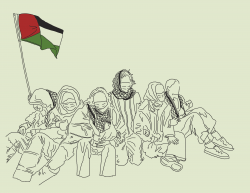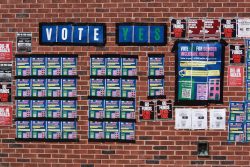Is Georgetown a place for free speech? If you’re a member of The Georgetown Academy, whose most recent issue was stolen shortly after it was distributed on campus last week, you probably don’t think so. If you’re the Foundation for Individual Rights in Education, which just gave Georgetown a “red light” rating for free speech protection, you probably don’t, either. But if you’re the average Georgetown student, you probably haven’t had too many problems with free speech restrictions. Just because the majority’s rights are protected, though, doesn’t mean Georgetown is doing well in terms of free speech. In fact, it is the minority?those whose views are more controversial or unpopular?that must be protected most. And although administrators have been judicious in their responses to most free-speech issues, their lack of action on certain key issues demonstrates that Georgetown still has work to do to ensure that the campus is truly open to all forms of expression.
The existence of Red Square as a designated free speech zone is the core of Georgetown’s commitment to allowing the open exchange of ideas. Nearly every student can recall a protest, speaker, flyer or demonstration there espousing a view or opinion that conflicted with his or her own. H*yas for Choice has distributed condoms to promote safe sex; GU Pride chalked to raise awareness about gay and lesbian issues on campus; Young Arab Leadership Alliance staged a mock Israeli checkpoint to show the Palestinian point of view of the situation in Israel. These events proceeded without any attempt by the University to censor the messages presented and ultimately raised the community’s level of discourse. This openness should continue unimpeded because it as just important to a liberal education as any of our classes. Further, it should be widened to include all areas of campus, not just a limited section.
The most troubling aspect of free speech at Georgetown is the degree of latitude that administrators wield over it. According to the University’s Free Speech and Expression Policy, Vice President for Student Affairs Juan Gonzalez can regulate speech on campus as he sees fit. He could have stopped any of the previously mentioned activities in Red Square, and he has the power to silence anything on campus he deems “indecent, grossly obscene or grossly offensive.” Fortunately, he hasn’t acted on this loophole, but its mere existence as a policy brings into question the University’s promise to protect free speech, as FIRE rightly points out. Furthermore, he has failed to deal effectively with controversies that involve generally disliked or offensive speech, such as 2001’s Fake Hoya newspaper or the recent theft of The Academy. In the latter case, he should make it clear that censorship, by students and administrators alike, will not be tolerated at all.
Georgetown needs to be more proactive to assure free speech. The best first step would be to amend the Speech and Expression Policy to allow students to hear everything and decide what they want to believe?sans administrative interference. Otherwise, the University can’t effectively carry out its mission of educating the whole person.




